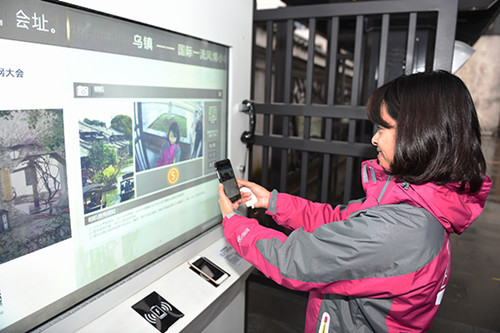
"It seems that the Internet has grown deep roots in the town. Even a modern city like Shanghai cannot compete with it in this aspect," she says.
While the rapid development of a smart town benefits tourists, residents are also enjoying the convenience of the Internet.
Wang Chenfeng runs a guesthouse in the scenic area of Wuzhen.
He says that last year's conference brought fame to the town and also more guests.
His guesthouse, with eight beds, is often fully booked via online platforms even during the off season.
According to statistics from the tourism department of Wuzhen, the number of tourists grew 30 percent year-on-year in the two months after the first World Internet Conference last year.
This year, the number is expected to hit 7 million, a record high.
Wang says that the name Wuzhen has gained recognition since the conference.
"In the past, when I introduced myself as a person from Wuzhen, people would ask which city or which province it belonged to," he says. "Now almost everyone knows Wuzhen and most people show interest in visiting the town."
Wang says that the rising popularity of the town also draws young people back to their hometown.
"Some young people have even resigned from their jobs in big cities to open guesthouses here," says Wang.
And the younger generation is not the only group of people in Wuzhen who are benefiting from the development.
Yang Lijuan has lived in Wuzhen her whole life. Although the 79-year-old does not understand what the "Internet" means, she gives a thumbs up when someone mentions it.
"Since they installed online home-care facilities in my home in August, I feel safer living alone," she says.
The online home-care that Yang refers to is a set of facilities, including sensors at the front door, a machine that can test blood pressure and a waterproof wristband that can send signals to smartphones.
Every morning, Yang tests her blood pressure via the machine, and the results are sent to the smartphones of her children and nurses at the elder-care center.


















































